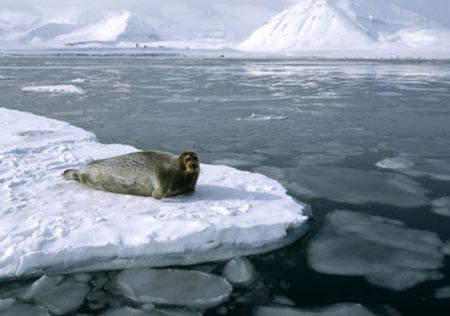The Arctic lost three times as much ice as Belgium every day
Images from the US satellite show that about 100,000 square kilometers of ice in the Arctic Ocean melted yesterday.
The US National Snow and Ice Data Center said the average melting area per day in the Arctic last month was 106,000 square kilometers, three times the size of Belgium. This melting speed is equivalent to the speed of July 2007. In September of that year the Arctic Ocean ice area reached a record low of 4.3 million square kilometers. As of last Thursday, the ice area was 6.75 million square kilometers.
The average global temperature increased by 0.6 degrees Celsius in the last century due to greenhouse gas emissions, but the temperature in the extreme north of the earth doubled, even higher than that. At the end of July, temperatures in some parts of the Arctic reached 30 degrees Celsius - an incredible number in the extreme.
In a report, the US National Snow and Ice Data Center said that the climate conditions in the Arctic this summer were the same as the summer of 2007. A block of high pressure air made the sky above the Beaufort Sea (a branch of the Arctic Ocean and northwest of Canada) is always clear. That situation caused the ice to melt quickly because of the sun.

In July this year the Arctic lost an average of 106,000 square kilometers of ice every day, equivalent to three times the area of Belgium.(Photo: greenpeace.org)
" The melting speed has increased in July and has decreased in recent days. The characteristics of the Arctic ice and climate have changed substantially in recent years. Thick ice sheets are making way for thin ice sheets. more, "said Walt Meier, a scientist at the National Center for Snow and Ice Data.
Environmental protection organizations are concerned that white bears will be more difficult in survival when the Arctic ice melts at greater speeds.
In winter, the sun sets below the horizon for months so the temperature in the Arctic will decrease. During that time, darkness and ice will cover the Arctic Ocean. The area of ice will increase compared to the summer, but most of the new ice will be thinner and weaker than the old ice blocks.
At a global conference in Copenhagen in March this year, scientists said climate change is happening faster than expected. They claim the dizzying melting of the Arctic is one of the most vivid evidence of this problem. A month later, the US Ocean and Atmospheric Administration predicted that the Arctic might not be ice in the summer in the next 30 years.
- The Arctic ice melted four times faster than forecast
- Belgium: Google lost the case
- Interesting facts about animals living in the Arctic
- What's going on with the Earth's 'refrigerator'?
- Travel to the Arctic in ancient times 55 million years ago
- Arctic sea ice area is at a record low
- Every second 14,000 tons of water flows into the sea because the Arctic ice melts
- The volume of ice in the Arctic drops to a record low
- What do you know about Manneken Pis - the pee boy standing in Belgium
- Melt ice will liberate hundreds of millions of tons of methane gas
- The extraordinary journey of the Arctic fox
- Arctic ice is melting record fast
 Surprised: Fish that live in the dark ocean still see colors
Surprised: Fish that live in the dark ocean still see colors Japan suddenly caught the creature that caused the earthquake in the legend
Japan suddenly caught the creature that caused the earthquake in the legend A series of gray whale carcasses washed ashore on California's coast
A series of gray whale carcasses washed ashore on California's coast Compare the size of shark species in the world
Compare the size of shark species in the world